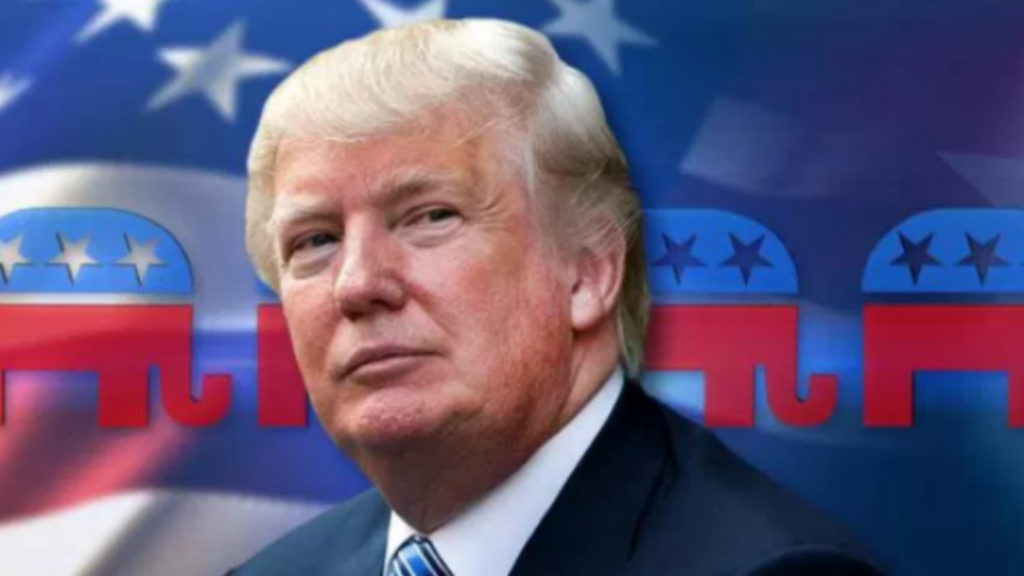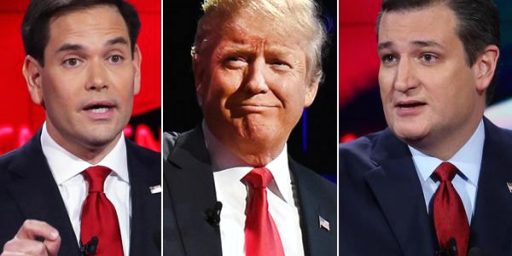“Subtract [Trump] from that equation…the numbers go up dramatically.”
As I have repeatedly noted: Trump is the leader of the Republican Party.
 Via the NYT: Top Trump Adviser Says Ted Cruz Could Lose Texas Senate Race.
Via the NYT: Top Trump Adviser Says Ted Cruz Could Lose Texas Senate Race.
A pair of top Republicans acknowledged in a private meeting on Saturday that the party was battling serious vulnerabilities in the midterm elections, including what one described as widespread “hate” for President Trump, and raised the prospect that Senator Ted Cruz of Texas could lose his bid for re-election because he is not seen as “likable” enough.
The two Republican leaders, Mick Mulvaney, the federal budget director, and Ronna McDaniel, the Republican National Committee chairwoman, assured party officials and donors at a closed-door event in New York City that the right would ultimately turn back a purported “blue wave” in November. Mr. Mulvaney also questioned whether Democrats could marshal support from outside the left, criticizing them as a party defined solely by opposition to Mr. Trump.
But Mr. Mulvaney and Ms. McDaniel also offered an unusually raw assessment of their own party’s strengths and weaknesses in the midterm elections. They pointed to the burning energy among Democratic voters and the dozens of open House seats, where Republican incumbents decided not to seek re-election, as fearsome obstacles to retaining control of Congress. And Mr. Mulvaney suggested Republicans would fare better if they could “subtract” the president’s divisive persona from voters’ minds, and stress instead that the country is in a “pretty good” condition.
“You may hate the president, and there’s a lot of people who do, but they certainly like the way the country is going,” Mr. Mulvaney said, adding of voters: “If you figure out a way to subtract from that equation how they feel about the president, the numbers go up dramatically.”
Emphasis mine (and boy, that last paragraph is almost the thesis of the NYT anonymous op/ed from this week).
The problem is, of course, that Republicans can’t “subtract from that equation how they feel about the president” because he is the leader of the party. I have been emphasizing this fact from very early in the administration.* Not only is he structurally the default leader of the party, the party has thoroughly embraced him. There was a scenario (which was always unlikely) that congressional Republicans would treat Trump like an outsider, but that has categorically not happened. Further, Republican voter support for the President remains quite high, so this was a thoroughly predictable outcome.
It is not possible to subtract Trump from the Republican Party, as he is the Republican Party is many very important way (as is any president the embodiment of their party).
As I wrote about candidate Trump in August of 2016 (in a post that is apt for the Mulvaney quote above: The Republican Dilemma):
here’s the dilemma: with Trump now pretty much at war with substantial elements of the Republican Party, including the highest elected Republican official, Speaker of the House Paul Ryan, the question is raised: what faction of the Republican Party is one going to adhere to? To stick with Trump is to admit that all his ideological and philosophical problems aren’t problems at all, and one has decided that Trump is the Republican Party. This is not, by the way, unusual. It is a feature of presidential systems that the presidency (and, therefore, candidates for the presidency) sets the tone for the party. This is as opposed to parliamentary systems where the executive is elected by the legislature (i.e., a Prime Minister) and the tone is set more by the party.
Basically I am struck by the logic trap that many Republicans are now in: they support Trump because he is the GOP nominee, but now he is largely rejecting the current mainline party, so if they continue to support him they have to acknowledge that they really aren’t supporting the party as much as they really just supporting Trump. Trump is the Republican Party at the same time he is fighting large chunks of it. He is putting himself outside and above the party in way that could have long-standing effects on the GOP.
At a minimum this underscores something I have been noting for some time: anyone who thinks Trump is going to be guided, controlled, or corralled as President by advisers, party insiders, etc. is fooling themselves. This includes those who are buying into the idea that Trump would appoint Justices to the Court that would be of conservatives’ liking.
To vote for Trump is to vote for trumpismo as the foundation of the Republican Party for the next four years.
Indeed, this is exactly how the party has acted (although I was wrong about the judicial appointments as I thought he would appoint cronies to the bench–instead, Trump has basically subcontracted that process to the Federalist Society). Even the “dissidents” like Flake have not separated from the party. This is the way party politics works in the US, especially when the president has the intra-party support of voters that Trump has. Indeed, while there were “Never Trumpers” and other high profile conservatives who opposed Trump during the campaign, there has been no intra-party fight of any consequence since Trump has been in office. The closest one can come is the McCain vote to block the Obamacare repeal.
As a side note: the fact that the Cruz race is so close is pretty remarkable, and the pathway for Democrats to take the Senate is far more feasible than one would have thought not that long ago.
*See:





I think the issue in the Cruz/O’Rourke race is about more than just Trump.
The same polls that show Cruz in an unusually right race for a Republican in Texas also show Greg Abbott and other statewide Republicans with substantial leads over their Democratic opponents. Part of the reason for that appears to be that O’Rourke is a stronger candidate than the other Democrats on the statewide ballot, but it has also been suggested, plausibly I think, that a good part of what’s going on here is the fact that Ted Cruz just isn’t a very likeable candidate.
@Doug Mataconis: Note that I did not really focus on that aspect of the NYT piece in my post.
And yes: Cruz is a bad candidate (but also an incumbent), but the national climate definitely matters in a Senate race.
The Democrats are running a very good candidate in what should be an unwinnable race, and that very good candidate is doing well. There’s more to it then that, but without a good candidate, the Democrats would have no opportunity to take advantage of the more to it.
Ted Cruz is unlikable — if he were doing the grass roots campaigning that Beto O’Rourke is doing, Cruz would be down by ten.
Trump is also unlikable. But there’s a huge overlap in the people who don’t like Cruz and the people who don’t like Trump. I think you are overestimating Trump’s effect here.
In Aug. 2017, Sean Trende did a thorough analysis of Dems’ chances of retaking the Senate the following year. This was, of course, before Doug Jones’ surprise win in Alabama was even on the horizon. Dems’ chances looked very bleak indeed: even if they held onto every seat they were defending, they needed to pick up three currently Republican-held seats, and it seemed only two were even remotely plausible: Nevada and Arizona. Everything after that was deep-red territory where Dems seemed to have no chance. Nevertheless—and this was the first time I encountered this theory—Trende concluded the best chance they had was in Texas:
Trende put this forth almost as a thought experiment, not something remotely likely to happen in practical reality. A lot has happened since then: not only Doug Jones’ victory (which means that in theory now Dems could capture the Senate simply by flipping NV + AZ alone, as long as they hold onto all their own seats), but TN with Democrat Phil Bredesen has come to look surprisingly competitive, and Beto’s campaign in Texas has taken off like no one imagined a year ago.
The key factors to keep in mind: (1) Cruz’s relative lack of popularity, and certainly lack of likability (2) Trump’s relatively modest performance in the state in 2016 (3) a highly energized Democratic opposition (4) Beto’s extraordinarily well-run campaign.
These factors were all noticeable last year. We’re starting to see evidence that they’re paying off, something that didn’t even seem possible before.
Of course one also needs to subtract the Republican policies on taxes (lots for the rich! the rest of you get an extra candy bar a week), birth control (an aspirin between the knees!), gun control (a gun for everyone, all the time, everywhere!)(except in the hallowed halls of congress of course) gay marriage (it is their right to discriminate on the basis of 2000 year old religious edicts!), abortion ( a woman is hostage to her biology!)(a man… God made man, just not that way), Social Security, Medicare, DACA, ad nauseum.
The only reason I can think of for why Republicans are in the majority is because so many Americans like being lied to. Well, that and they are afraid of the boogeyman.
@Steven L. Taylor:
I agree that the national climate is a factor here, but it does appear that Cruz may be his own worst enemy.
One should think you were wrong as you say here
due to underestimating the sheer laziness of the Orange creature.
It is his saving grace.
“If you figure out a way to subtract from that equation how they feel about the president, the numbers go up dramatically.”
Slick Mick Mulvaney
This would be like taking the stink out of sh!t.
You can’t do it.
Two years working at the Murphysboro Sewage Treatment Plant taught me that much.
Cruz is his own worst enemy. The man’s persona is creepy. And he didn’t make a lot of friends among the Republicans in the senate. The toadying he did to Trump after Trump accused his father of being an assassin and his wife of being ugly and crazy was simply loathsome.
O’Rourke, on the other hand, is fresh, young-seeming, and Kennedyesque in the sense that John and Robert were. It’s like a throwback to the early sixties, when young, fresh, sexy Jack and his glamorous wife replaced Grandpa Ike and his dowdy wife Mamie.
@OzarkHillbilly:..they are afraid of the boogeyman.
And Crystal Mason.
I can’t conceive of any situation or event, political or not, where removing Trump would not be an improvement.
@Mister Bluster: The horror… A US Citizen casting a vote. We told you there was voter fraud!!!!!!!!!!!!!!!
There are degrees of unlikable. Ted Cruz, who any decent person would wish to smash in the face, stands out. But it’s always been OK in Texas before.
If Cruz versus O’Roarke was a special election, I believe that O’Roarke would win. I live in a very red part of Texas, and I am currently seeing more signs and bumper stickers for Beto than for any GOP candidate running for statewide election.
However, in Texas, we have party line voting, which allows the voter to press “R” or “D” at the top of the ballot and then skipping straight through to submit. As noted already, the only Republican running statewide who is struggling is Cruz. All of the others are likely to get easy wins.
It’s one thing for a GOP-leaning voter to prefer Beto. It is another to get them to actively overcome their sense of tribalism to actively alter their ballot for that one race on fairly full ballot.
@Gromitt Gunn:
But then again, Ted Cruz.
What has struck me about the current situation is how powerful the Republicans would be right now had someone who is seen as “more moderate” like John Kasich had won the nomination and subsequently the presidency. The GOP would have gotten every thing they have now with far less of the visceral hatred that Trump draws. However it possible that Clinton would have beat Kasich because I don’t think that he would have brought in some of the new voters that Trump did.
But without mulling over the counter factual too much, had a guy like John Kasich won the presidency, the GOP would have completed their taker over of all branches of government without any of the fervent backlash that Trump is inspiring.
@Rick DeMent:
And without the attacks on the global political and economic order, emboldening of white nationalism, child separation, and contempt for rule of law (among other things). Don’t forget what would not have been.
Yes, there would have been tax cuts and regulation. There would have been conservative judges.
I assumed this post was going to be about average IQ or something.
Not surprisingly, Al Franken had the best take on Cruz: “I like Ted Cruz more than any other Senator, and I hate Ted Cruz.”
@OzarkHillbilly: Still, there’s inertia to overcome. If you’ve spent 2o years going to the polls an checking only one box to be done…
You have to REALLY dislike Ted Cruz to deliberately decide to vote on each race in order to vote against HIM. That may be enough people to tip the balance… maybe…
@Just nutha ignint cracker: Actually, IIRC about Texas law, you can fill in the straight ticket box and still deviate by specific election–i.e., you could vote straight R and still vote D in the Senate race.
From Vote Texas web site.
Per Ballotpedia
Texas: Repeal of straight-ticket voting scheduled to take effect September 1, 2020.
@Mister Bluster: That was my recollection.
@Steven L. Taylor: Yes. I normally hit “D” and then go any manually change any races that require deviation. It is a pain in the butt for General Elections because there is normally about four pages of elected judges you have to wade through to isolate the races in question and find the referendum questions.
Straight-ticket Voting in Illinois Gets Its Final Knockout Punch (1997)
I had the option of straight ticket voting in Illinois from my first ballot cast for George McGovern in 1972 (Impeach Nixon-Now More Than Ever) till it was eliminated 25 years later.
Now every time I am forced to be more thoughtful as I check all the boxes next to the Democratic Candidates I wonder what the Republicans were trying to accomplish.
@Steven L. Taylor @Mister Bluster: Thanks. Then the question becomes how many people bother to go through to change one item? I appreciate that Grommet Gunn does, but he or she may be an outlier. I’m not trying to start an argument here, just noting that inertia may be as strong a political/social/cultural force as it is a physical one.
I commented in a different thread a while back about how I hadn’t seen a single ted cruz sign down here even at the hardcore “trump that bitch” houses. Well I finally found a Ted Cruz sign friday. Two houses down was a Beto sign.
@Just nutha ignint cracker:..Then the question becomes how many people bother to go through to change one item?
I found this.
See the straight-ticket breakdown in Texas’ 10 most-populous counties
Not very encouraging, Bluster.